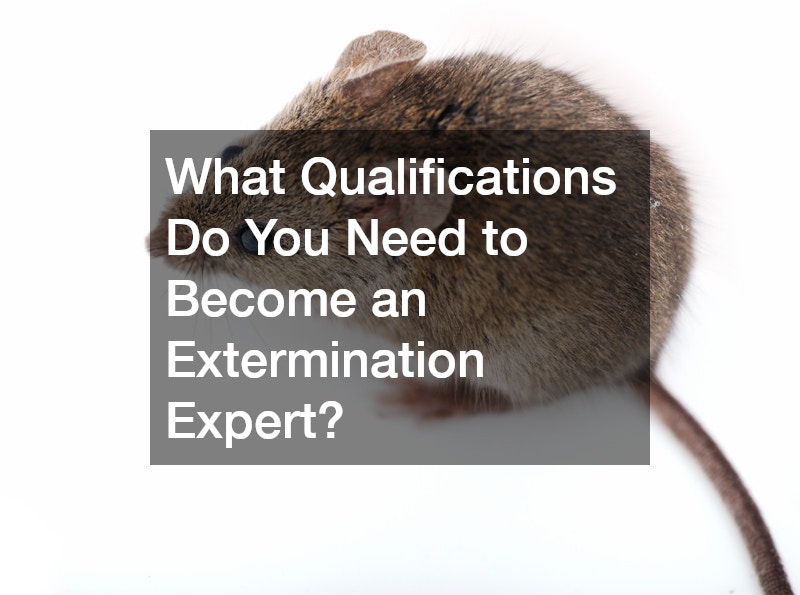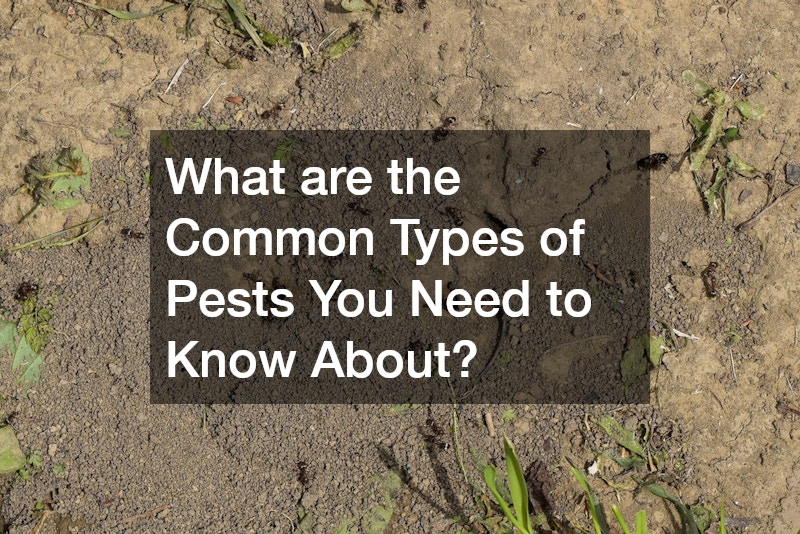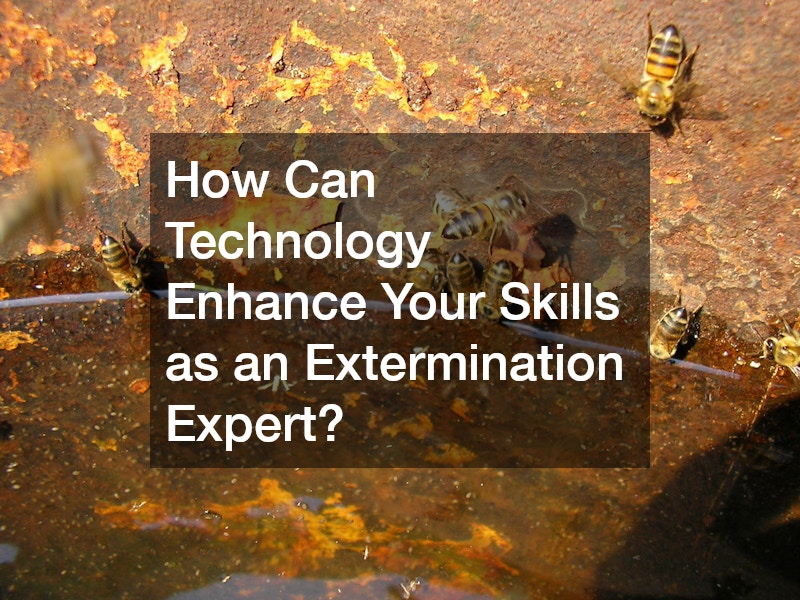Becoming an extermination expert is an intricate journey that entails both formal knowledge and practical experience. This article serves as a comprehensive guide, outlining the critical steps needed to achieve expertise in the extermination field. Whether your interest lies in the intricacies of pest control, the captivating world of entomology, or the challenges of establishing your own extermination business, this article addresses all the essentials. Within these sections, you will find a detailed roadmap covering qualifications, practical experience, necessary tools, pest identification, ongoing education, health and safety measures, technological enhancements, business acumen, ethical considerations, and career opportunities.
Success in the extermination industry requires not only technical proficiency but also a commitment to continuous learning and adaptability. Understanding local and federal regulations, staying informed about emerging pest threats, and refining customer service skills can set you apart in the field. Additionally, networking with industry professionals and joining pest management associations can provide valuable insights and opportunities for professional growth. By following these guidelines, you will be well-prepared to navigate this rewarding and dynamic profession and ultimately become a respected extermination expert, capable of addressing pest-related challenges with confidence and expertise.
What Qualifications Do You Need to Become an Extermination Expert?

To begin your path as an extermination expert, acquiring the right qualifications is a crucial first step. This often starts with obtaining a high school diploma, which provides a solid educational foundation. Many aspiring exterminators opt to further their knowledge by enrolling in specialized programs, which can include courses in entomology, biology, and chemistry. Such courses equip you with detailed knowledge about pests and their behaviors, aiding in effective pest control.
Additionally, obtaining certification is a key requirement to solidify your status as a professional exterminator. Certification programs often include comprehensive training and exams to ensure a deep understanding of pest management principles and practices. These credentials not only validate your skills and knowledge but also establish trust with potential clients.
Moreover, becoming an extermination expert may require obtaining regional licenses, allowing you to legally practice in your area. These licenses often necessitate ongoing education to stay current with the latest pest management technologies and regulations. As environmental laws evolve, being a licensed professional aligns you with industry standards and helps in maintaining accountability.
How Can You Gain Practical Experience in Extermination?
Hands-on experience is integral in becoming a proficient extermination expert, as it reinforces theoretical learning with real-world application. One effective way to gain practical experience is through internships or apprenticeships with established extermination companies. This on-the-job training allows you to work closely with experienced exterminators and learn the nuances of effective pest control strategies.
Furthermore, volunteering with community pest control projects or conservation programs can provide valuable experience. These opportunities often expose you to diverse pest management challenges, requiring innovative problem-solving skills that are crucial to honing one’s expertise. Such experiences also enhance your resume and showcase your commitment to the profession.
In addition to structured programs, pursuing freelance or part-time roles while collaborating with other service professionals, like a fence contractor, can also be beneficial, especially if fence repair is necessary. They can also help if you need an iron fence installation. Working alongside diverse tradespeople expands your network and exposes you to complementary disciplines that, although indirectly related, offer insight into integrated pest management solutions.
What Tools and Equipment are Essential for an Extermination Expert?
Becoming an extermination expert requires familiarity with a wide range of tools and equipment crucial for effective pest management. Essential tools include sprayers for chemical treatments, baiting systems, traps, and protective gear such as masks and gloves to ensure safety while handling toxic substances. Investing in these tools not only enhances efficiency but also demonstrates professionalism to your clients.
Advancements in technology have introduced innovative devices like thermal imaging cameras and pheromone traps, which aid in precise pest detection and monitoring. These high-tech tools provide a competitive edge, allowing exterminators to offer more accurate and effective solutions. Similarly, security cameras integrated with home security systems can be used to monitor pest activity and assess the effectiveness of control measures.
Moreover, the implementation of digital reporting tools and management software enables exterminators to streamline their operations. Such tools facilitate detailed tracking of pest activities and client interactions, ultimately boosting service quality and customer satisfaction. Mastering the use of these various tools and equipment positions you as a knowledgeable and skilled extermination expert.
What are the Common Types of Pests You Need to Know About?

An extermination expert must have a thorough understanding of the various types of pests they might encounter. Common categories include insects, such as ants, cockroaches, and bedbugs, which often require targeted chemical treatments. Another major category is rodents, including mice and rats, typically managed through traps and poison baits.
Additionally, pests like termites necessitate specialized knowledge, given their potential to cause severe structural damage. Effective termite management involves a combination of chemical barriers, bait systems, and monitoring for optimal results. Being knowledgeable about these diverse pests allows the exterminator to tailor strategies for specific infestations.
Understanding the habitats and life cycles of pests is crucial for prevention and long-term control. Regularly updated knowledge about common pests enhances an extermination expert’s capability to swiftly diagnose and address infestations. This dedication to expertise sets a seasoned exterminator apart from the competition.
How Do You Stay Updated with the Latest Extermination Techniques?
In the dynamic field of pest management, staying current with the latest extermination techniques is vital for continuous improvement. This often involves attending workshops and seminars that delve into emerging pest control methods and innovative technology. Such events provide opportunities to learn from industry leaders and exchange ideas with fellow professionals.
Many extermination experts also participate in online courses and webinars that offer flexible learning options for industry advancements. Access to digital resources and expert-led training ensures that exterminators remain well-versed in current practices while effectively managing their schedules. This dedication to ongoing education enhances professional credibility and service delivery.
Networking with peers through professional organizations and forums is another effective way to stay informed. Sharing insights with other exterminators, and service providers like those in fence services, fosters a collaborative environment for knowledge exchange. Staying dynamically engaged in the field not only keeps your skills sharp but also strengthens your position as a formidable extermination expert.
What are the Health and Safety Considerations for Extermination Experts?
Health and safety considerations are paramount for any extermination expert working with potentially hazardous substances. Proper training in the safe handling and application of pesticides and chemicals is critical to minimize risks associated with exposure. This training typically includes understanding chemical labels, using safety equipment, and adhering to regulatory guidelines.
Maintaining robust safety protocols helps prevent accidents and health issues, safeguarding both the exterminator and the client. These protocols include wearing protective gear, such as respirators, gloves, and goggles, as well as ensuring that chemical products are stored securely. Awareness and adherence to these measures solidify your reputation as a conscientious exterminator.
Furthermore, having health indemnities and emergency response plans in place is an essential aspect of the practice. Such planning includes preparing for contingencies like accidental spills or inhalation. Knowledgeable professionals emphasize safety, showcasing their expertise as responsible and reliable extermination experts.
How Can Technology Enhance Your Skills as an Extermination Expert?

The integration of technology in pest management has significantly enhanced the capabilities of extermination experts. For instance, the use of thermal imaging and drones allows for rapid and thorough inspections of large or challenging areas. This technology provides real-time data that helps in formulating effective pest control strategies.
Software solutions for scheduling, reporting, and customer communication streamline daily operations and improve service delivery. Mobile apps that monitor pest activity offer exterminators the ability to make data-driven decisions and optimize pest control interventions. These advancements in technology ensure high efficiency and customer satisfaction in service delivery.
Moreover, implementing advanced management systems for inventory control and client interactions positions exterminators in the competitive market. Adopting these digital tools not only amplifies business efficiency but also solidifies a consultant’s status as a modern and proficient extermination expert. Consistently leveraging technology showcases adaptability and forethought in addressing the needs of contemporary clients.
What Business Skills Do You Need to Start Your Own Extermination Business?
Establishing a successful extermination business requires a blend of industry knowledge and essential business skills. Understanding business fundamentals such as strategic planning, marketing, finance management, and customer service is crucial to launching and sustaining your venture. These skills help in creating a solid business foundation.
Strong organizational skills and effective communication are critical for managing day-to-day operations and ensuring client satisfaction. Moreover, as an extermination entrepreneur, building a reputable brand through effective marketing strategies and customer testimonials establishes credibility and trust within the community.
Networking with complementary service providers, such as those in the Septic Tank Cleaning and sewer line repairs sectors, can open up opportunities for partnerships and business expansion. Collaborative expertise facilitates comprehensive service offerings, reinforcing your position as a well-rounded and resourceful extermination expert. Nurturing these business skills and relationships is essential for thriving in this competitive market.
How Does Ethics Play a Role in Extermination?
Ethical practices are a fundamental component of a responsible pest management business. Extermination experts must conduct their work with integrity and uphold the highest professional moral standards. This involves committing to socially and environmentally responsible methods that prioritize the well-being of clients, wildlife, and the broader ecosystem.
Adhering to ethical principles also entails transparency with clients, and providing clear information on treatment methods, risks, and expected outcomes. By communicating openly, exterminators foster trust and ensure clients feel informed and comfortable with pest control procedures. Upholding such standards reflects well on professional extermination practices.
Furthermore, staying compliant with regulations and minimizing harm to non-target species and ecosystems are critical ethical considerations. Extermination experts know the importance of balancing effective pest control with conservation efforts. These ethical practices not only define an exterminator’s reputation but also contribute to the sustainable advancement of the pest management industry.
What Career Opportunities Exist for Extermination Experts?

The field of pest management offers a wide array of career opportunities for aspiring extermination experts. Positions range from on-the-ground pest control technicians to consultant roles in large corporations offering strategic pest management solutions. These roles cater to various levels of expertise and interests within the extermination sector.
The entrepreneurial path offers opportunities to launch your own pest management business, where you can integrate lessons from related fields such as bathroom remodeling contractors, ensuring innovative approaches to pest control. Running a business demands versatility and resilience but presents high rewards in terms of autonomy and potential profitability.
Beyond direct pest control, career paths may also extend into academic research and education within entomology or environmental sciences. Sharing knowledge about pest behavior and control methods contributes to the ongoing development of the industry and inspires the next generation of extermination experts.
Becoming an Extermination Expert
The journey to mastering the art of extermination is a multifaceted and ongoing endeavor. Armed with formal education, practical experience, and dedication to continual improvement, aspiring professionals can emerge as proficient extermination experts. This article has traversed the principal pathways, from acquiring essential qualifications to embracing technological advancements and ethical practices.
The pursuit of extermination expertise is enriched by the wealth of opportunities available, including independent practice, collaboration, and specialization within the pest management industry. Leveraging the guidance provided, you are equipped with the knowledge and skills vital for navigating the multifaceted landscape of the extermination field. Staying informed about industry regulations, environmental considerations, and customer service best practices further strengthens your professional standing.
By mastering these varied skills and insights, you are well-prepared to serve clients effectively and responsibly. Whether choosing to innovate or expand within the profession, the path of becoming an extermination expert promises a rewarding experience, marked by consistent growth and fulfillment. The steps outlined in this article serve as a foundation for transforming your dedication into undeniable expertise and success. As the industry continues to evolve with new pest control methods, safety measures, and customer expectations, maintaining a commitment to ongoing education and hands-on experience ensures that you remain at the forefront of the field, providing exceptional service and solutions.

